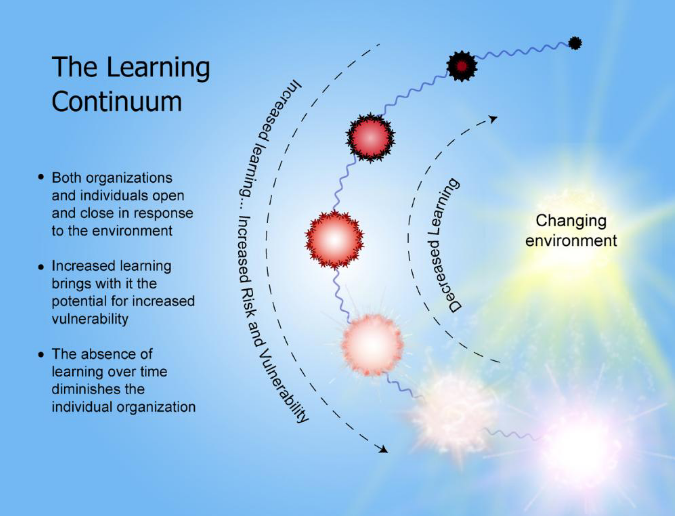Lucidea’s Lens: Knowledge Management Thought Leaders Part 12 – Alex Bennet

Stan Garfield

Alex Bennet is co-founder of the Mountain Quest Institute (MQI), a center focused on achieving growth and understanding through questions for knowledge, consciousness, and meaning. Alex was Chief Knowledge Officer and Deputy CIO for Enterprise Integration for the U.S. Department of the Navy from 1998-2002. She also served as co-chair of the Federal KM Working Group. She holds four degrees: BIS (Bachelor of Individualized Study: Marketing and English Literature), MS (Management for Effectiveness), MA (Human Development), and PhD (Human and Organizational Systems).
She has written hundreds of papers and co-authored five books with her partner, David Bennet. They developed a new theory of the firm based on the Intelligent Complex Adaptive System (ICAS) model for organizations and did ground-breaking work with the government of Canada on Knowledge Mobilization in the Social Sciences and Humanities. Her research interests include knowledge sharing, learning theory, change leadership, consciousness studies, collaborative leadership, thought leadership, decision making, and complexity theory.
Profiles
Books
- Amazon Author Page
- Leading with the Future in Mind: Knowledge and Emergent Leadership with David Bennet and John Lewis
- Decision Making in The New Reality: Complexity, Knowledge and Knowing with David Bennet
- Knowledge Mobilization in the Social Sciences and Humanities: Moving from Research to Action with David Bennet, Fleur Flohil, and Francisco Javier Carrillo
- Expanding the Self: The Intelligent Complex Adaptive Learning System: A New Theory of Adult Learning with David Bennet and Robert Turner
- The power of team: The making of a CIO
- The Course of Knowledge: A 21st Century Theory with David Bennet and Joyce Avedisian
Organizational Survival in the New World: The Intelligent Complex Adaptive System with David Bennet

Table of Contents
Part I: The Groundwork
- Chapter 1 – Moving Beyond the Bureaucratic Model
- Chapter 2 – The Present and Future Danger, or Why We Need to Change
Part II: The Theory
- Chapter 3 – The Intelligent Complex Adaptive System
- Chapter 4 – Exploring the Emergent Properties of the ICAS
- Chapter 5 – Relationships Among Emergent Properties
Part III: The ICAS in Practice
- Chapter 6 – The Learning Structure of the New Organization
- Chapter 7 – The Action Culture for Success
- Chapter 8 – The Four Major Organizational Processes
- Chapter 9 – The Art of Collaborative Leadership
- Chapter 10 – Creating Emergence
- Chapter 11 – The Change Agent’s Strategy
- Chapter 12 – Strategy, Balance, and the Correlation of Forces
- Chapter 13 – A Tale of Two Firms
Part IV: The Knowledge Solution
- Chapter 14 – The New Knowledge Worker
- Chapter 15 – Knowledge Management
- Chapter 16 – The Learning Organization
- Chapter 17 – Learning, Knowledge Management, and Knowledge Workers
- Chapter 18 – Rethinking Thinking: Systems
- Chapter 19 – Rethinking Thinking: Complexity
- Chapter 20 – Knowing
- Chapter 21 – Networking for the Bottom Line
Part V: The Probable Future
- Chapter 22 – Exploring the Unknown
- Chapter 23 – Summary: And Then There Was the ICAS
Appendix – The Evolution of the Organization
Other Content
- 2011 W5: Sustainability: Critical Factors for Organizational Success
- 2010 Knowledge to Action — Slides
Current Content
Archived Content
- Knowledge
- Learning
- Knowledge and Knowledge Management
- Knowledge Mobilization
- Knowing
- ICAS (Intelligent Complex Adaptive System
- ICAP (Intelligent Complex Adaptive Professionals)
- ICAT (the Intelligent Complex Adaptive Team)
- Reality and Consciousness
Articles
The fallacy of knowledge reuse: Building sustainable knowledge with David Bennet
Several dangers come into play for community experts in a specific domain of action. If the domain changes and the expert does not recognize it, then the application of his/her knowledge can fail. On the other hand, the expert may recognize that a situation is different but think that current knowledge will work when, in fact, it will not. Another issue enters at this point. Since individuals typically find what they are looking for, or see what they expect to see, there is a bias to interpret a problem from an historical, proven, and comfortable frame of reference, one that may not recognize the complexities of the current problem. This produces a bias toward knowledge reuse. At any single point in time no one can see beyond their threshold of perception (based on a lifetime of living and learning). Another bias toward knowledge reuse arises because f the perception of a “blessed history”. The ramifications or loss of face when “tried and true solutions” fail may be considerably less than when new, creative solutions fail. An advantage in looking to the human brain for answers rather than to an information system is that the human brain is more likely to take into account the uniqueness of each situation. Unfortunately, our brains also carry baggage from the past in terms of prejudice; technology has no prejudices, but it never forgets.
The Partnership Between Organizational Learning and Knowledge Management with David Bennet
As uncertainty and complexity increase in the future, and decisions become more challenging, individual, team and organizational learning, coupled with a strong knowledge management program offers the best capability an organization can have to change, adapt and influence its environment in a way that maximizes its performance overtime. Within the organization, focused, flexible and friendly communities will help knowledge workers continually learn and change. By combining the strengths of organizational learning and knowledge management, smart organizations will create cultures, structures, and leadership styles that enable them to scan, perceive, evaluate, anticipate and take effective action on new, ambiguous, unexpected and complex threats and opportunities. Achieving such an ideal is as challenging as it is productive.


Stan Garfield
Please enjoy Stan’s blog posts offering advice and insights drawn from many years as a KM practitioner. You may also want to download a copy of his book, Proven Practices for Implementing a Knowledge Management Program, from Lucidea Press. And learn about Lucidea’s Presto and SydneyEnterprise with KM capabilities to support successful knowledge curation and sharing
Never miss another post. Subscribe today!
Similar Posts
Lucidea’s Lens: Knowledge Management Thought Leaders Part 106 – Hubert Saint-Onge
As the creator of the Knowledge Assets Framework Hubert has shaped how businesses integrate strategy leadership and knowledge sharing to drive performance.
Lucidea’s Lens: Knowledge Management Thought Leaders
Part 105 – James Robertson
James Robertson is a pioneer in intranet strategy and digital workplace design helping organizations create seamless employee experiences. As the Founder of Step Two and a respected industry voice he has shaped best practices in content management portals and digital experience design.
Lucidea’s Lens: Knowledge Management Thought Leaders
Part 104 – Vincent Ribière
Vincent Ribière advances knowledge and innovation management through AI creativity and KM. Explore his work in academia research and industry leadership.
Lucidea’s Lens: Knowledge Management Thought Leaders Part 103 – Tony Rhem
In this edition of Lucidea’s Lens: Knowledge Management Thought Leaders we highlight Dr. Tony Rhem a leading expert in AI big data information architecture and innovation. As CEO of AJ Rhem & Associates Tony has shaped the fields of knowledge management governance and emerging technologies.
Leave a Comment
Comments are reviewed and must adhere to our comments policy.





So nice to see Alex Bennett highlighted. Have known and respected the Bennetts many talents and kindness for many years. Their gift of knowledge exploration combined with sincere caring fir humanity highlights what goodness can do. Cheers Alex!